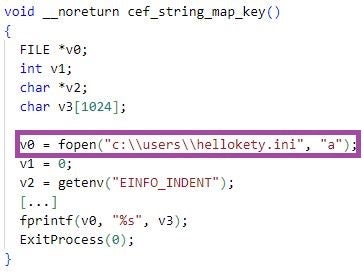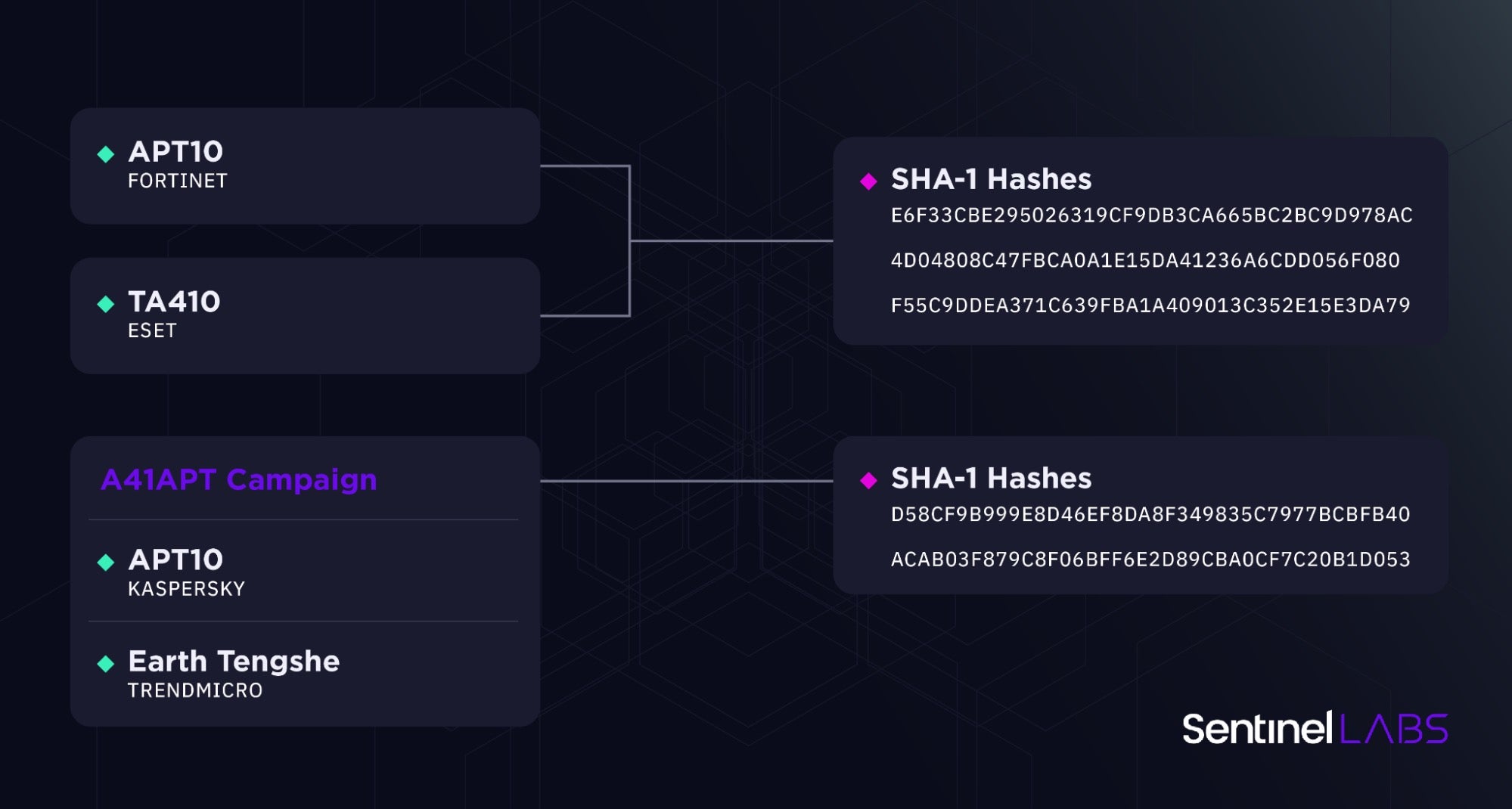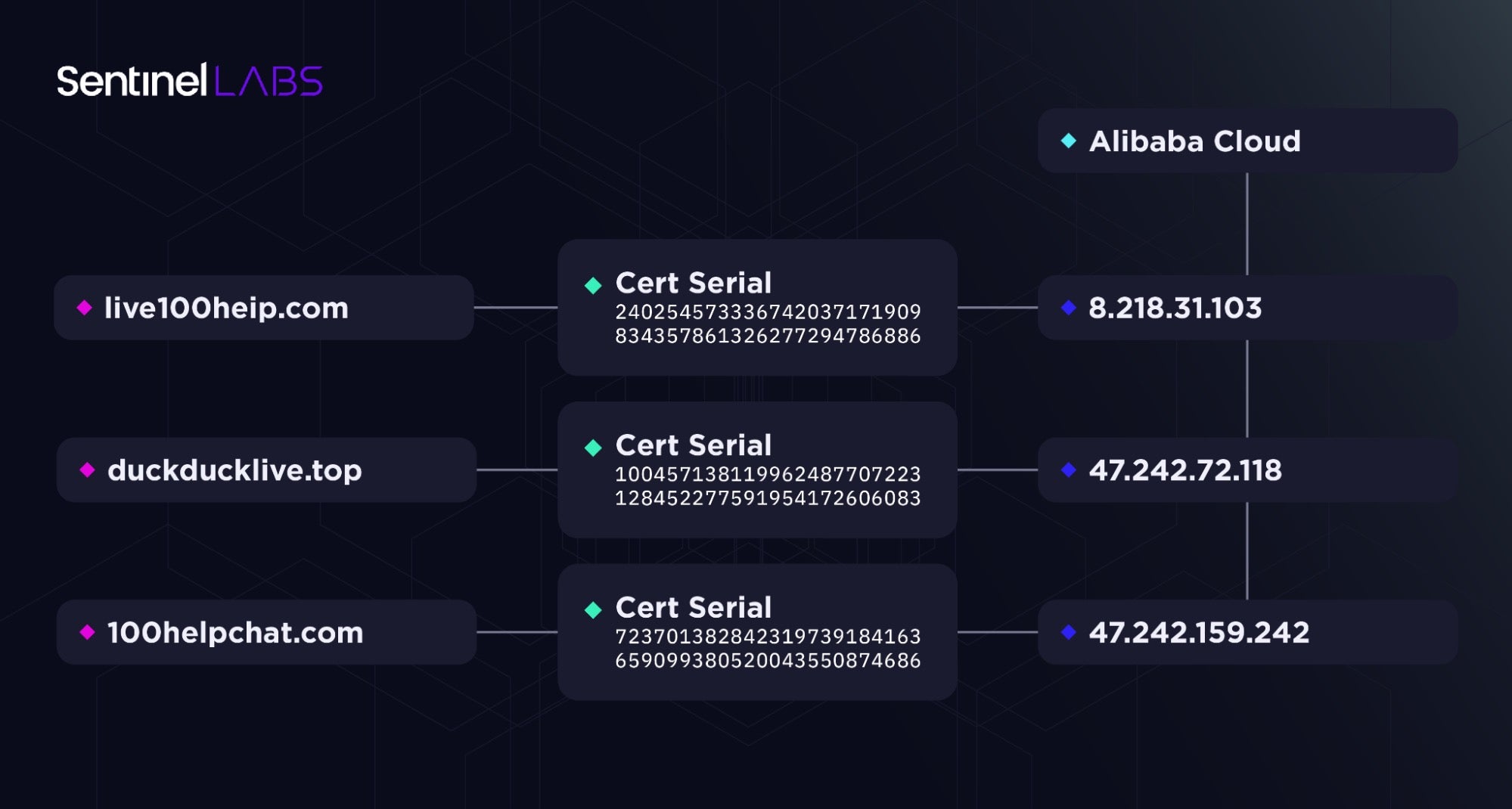By Aleksandar Milenkoski and Tom Hegel
Executive Summary
- SentinelLabs has identified suspected-Chinese malware and infrastructure potentially involved in China-associated operations directed at the gambling sector within Southeast Asia.
- The threat actors abuse Adobe Creative Cloud, Microsoft Edge, and McAfee VirusScan executables vulnerable to DLL hijacking to deploy Cobalt Strike beacons.
- We’ve observed related malware using the signature of a likely stolen code signing certificate issued to PMG PTE LTD, a Singapore-based vendor of Ivacy VPN services.
- Indicators point to the China-aligned BRONZE STARLIGHT group; however, the exact grouping remains unclear due to the interconnected relationships among various Chinese APT groups.
Overview
Thriving after China’s crackdown on its Macao-based gambling industry, the Southeast Asian gambling sector has become a focal point for the country’s interests in the region, particularly data collection for monitoring and countering related activities in China.
We observed malware and infrastructure likely related to China-aligned activities targeting this sector. The malware and infrastructure we analyze are related to indicators observed in Operation ChattyGoblin and are likely part of the same activity cluster. Operation ChattyGoblin is ESET’s name for a series of attacks by China-nexus actors targeting Southeast Asian gambling companies with trojanized Comm100 and LiveHelp100 chat applications.
The targeting, used malware, and C2 infrastructure specifics point to past activities that third parties have linked to the China-aligned BRONZE STARLIGHT group (also known as DEV-0401 or SLIME34). This is a suspected Chinese ‘ransomware’ group whose main goal appears to be espionage rather than financial gain, using ransomware as means for distraction or misattribution. Team T5 has also reported on BRONZE STARLIGHT’s politically-motivated involvement in targeting the Southeast Asian gambling industry.
Despite the indicators observed, accurate clustering remains challenging. The Chinese APT ecosystem is plagued by extensive sharing of malware and infrastructure management processes between groups, making high confidence clustering difficult based on current visibility. Our analysis has led us to historical artifacts that represent points of convergence between BRONZE STARLIGHT and other China-based actors, which showcases the complexity of a Chinese threat ecosystem composed of closely affiliated groups.
Background
ESET reported that a ChattyGoblin-related attack in March 2023 targeted the support agents of a gambling company in the Philippines. In the attack, a trojanized LiveHelp100 application downloaded a .NET malware loader named agentupdate_plugins.exe. The final payload was a Cobalt Strike beacon using the duckducklive[.]top domain for C2 purposes. The hash of this malware loader was not disclosed.
We subsequently identified malware loaders that we assess are closely related to those observed as part of Operation ChattyGoblin and are likely part of the same activity cluster – a .NET executable also named agentupdate_plugins.exe and its variant AdventureQuest.exe.
This association is based on naming conventions, code, and functional overlaps with the sample described in ESET’s report. Although we cannot conclusively determine whether the agentupdate_plugins.exe we analyzed is the same as that reported by ESET, we note that one of its VirusTotal submissions is dated March 2023 and originates from the Philippines. This aligns with the geolocation of the target and the timeline of the ChattyGoblin-related attack involving agentupdate_plugins.exe.
The Malware Loaders
agentupdate_plugins.exe and AdventureQuest.exe deploy .NET executables based on the SharpUnhooker tool, which download second-stage data from Alibaba buckets hosted at agenfile.oss-ap-southeast-1.aliyuncs[.]com and codewavehub.oss-ap-southeast-1.aliyuncs[.]com. The second-stage data is stored in password-protected zip archives.
The zip archives downloaded by agentupdate_plugins.exe and AdventureQuest.exe contain sideloading capabilities. Each of the archives we were able to retrieve consists of a legitimate executable vulnerable to DLL search order hijacking, a malicious DLL that gets sideloaded by the executable when started, and an encrypted data file named agent.data.
The executables are components of the software products Adobe Creative Cloud, Microsoft Edge, and McAfee VirusScan. The malicious DLLs masquerade as their legitimate counterparts: They export functions with the same names, such that specific functions, when invoked by the legitimate executables, decrypt and execute code embedded in the data files. The data files we could retrieve implement Cobalt Strike beacons.
| Zip archive | Archive content | Final payload |
| adobe_helper.zip (agentupdate_plugins.exe) | Adobe CEF Helper.exe libcef.dll agent.data (not available) | / |
| cefhelper.zip (AdventureQuest.exe) | identity_helper.exe msedge_elf.dll agent.data | Cobalt Strike C2: www.100helpchat[.]com |
| Agent_bak.zip (AdventureQuest.exe) | mfeann.exe LockDown.dll agent.data | Cobalt Strike C2: live100heip[.]com |
The 100helpchat[.]com and live100heip[.]com C2 domains follow the naming convention of the LiveHelp100 trojanized application used in operation ChattyGoblin, possibly to make malicious network activity look like legitimate LiveHelp100 activity.
agentupdate_plugins.exe and AdventureQuest.exe implement geofencing based on the ifconfig.co IP-based geolocation service. The loaders are meant to stop their execution if they are run on a machine located in the United States, Germany, France, Russia, India, Canada, or the United Kingdom. This may indicate that the threat actors have no interest in intrusions in these countries for this campaign. Due to errors in implementation, the geofencing fails to work as intended.
Stolen Ivacy VPN Certificate
AdventureQuest.exe is signed using a certificate issued to the Ivacy VPN vendor PMG PTE LTD:
- Thumbprint: 62E990CC0A26D58E1A150617357010EE53186707
- Serial number: 0E3E037C57A5447295669A3DB1A28B8A.
Ivacy has been present on the market since 2007 and attracts users with low-price offerings.
It is likely that at some point the PMG PTE LTD singing key has been stolen – a familiar technique of known Chinese threat actors to enable malware signing. VPN providers are critical targets, since they enable threat actors to potentially gain access to sensitive user data and communications.
At the time of writing, we have not observed any public statements by PMG PTE LTD clarifying the circumstances that have led to the use of their signing keys for signing malware. The DigiCert Certificate Authority has revoked the compromised certificate after a public discussion on the issue.
HUI Loader
The malicious DLLs libcef.dll, msedge_elf.dll, and LockDown.dll distributed by agentupdate_plugins.exe and AdventureQuest.exe are HUI Loader variants. HUI Loader is a custom malware loader shared between several China-nexus groups. The loader is executed through sideloading by legitimate executables vulnerable to DLL hijacking and stages a payload stored in an encrypted file. HUI Loader variants may differ in implemented payload staging and execution techniques as well as additional functionalities, such as establishing persistence and disabling security features.
libcef.dll, msedge_elf.dll, and LockDown.dll closely resemble HUI Loader variants observed in a string of cyberespionage and ransomware operations that third parties have linked to APT10, TA410, and BRONZE STARLIGHT.
| Threat actor | Description |
| BRONZE STARLIGHT Aliases: DEV-0401, SLIME34 |
A China-based ransomware operator active since 2021. The group is known for deploying a variety of ransomware families, such as LockFile, AtomSilo, NightSky, LockBit 2.0, and Pandora, and shares tooling with APT10. BRONZE STARLIGHT’s main goal is suspected to be espionage rather than financial gain, using ransomware as means for distraction or misattribution. |
| APT10 Aliases: BRONZE RIVERSIDE, MenuPass |
A China-nexus cyberespionage group active since at least 2009. The group focuses on targeting entities considered strategically important by the Chinese state. |
| TA410 | A China-nexus cyberespionage group loosely linked to APT10, tracked as a distinct entity. The group is mostly known for targeting the US utilities sector and Middle Eastern governments. |
APT10 and TA410 Operations
The cef_string_map_key function of libcef.dll downloaded by agentupdate_plugins.exe references the C:\Users\hellokety.ini file.
 The cef_string_map_key function
The cef_string_map_key function
HUI Loader variants with this exact artifact have been reported as part of several cyberespionage operations:
- enSilo (now Fortinet) has disclosed cyberespionage activities in Southeast Asia observed in April 2019 and attributed them with medium confidence to APT10.
- Researchers from Macnica, Secureworks, and Kaspersky have presented on A41APT campaign activity conducted throughout 2021. A41APT is a long-running cyberespionage campaign targeting Japanese companies and their overseas branches. Kaspersky has attributed earlier A41APT activity (from March 2019 to the end of December 2020) with high confidence to APT10. TrendMicro has attributed A41APT activity over 2020 and 2021 to a group they track as Earth Tengshe, noting that Earth Tengshe is related to APT10 with some differences in employed TTPs.
- ESET has presented on TA410 activities, noting the
hellokety.iniartifact in this context. ESET also notes the possibility of misattribution the April 2019 activities reported by Fortinet to APT10 instead of TA410.
 HUI Loader variants (hellokety.ini) used in APT10 and TA410 operations
HUI Loader variants (hellokety.ini) used in APT10 and TA410 operations
BRONZE STARLIGHT Operations
Since around 2021, HUI Loader variants have been deployed in operations involving the ransomware families LockFile (Symantec, 2021; NSFOCUS, 2021), AtomSilo (Sophos, 2021), NightSky (Microsoft, 2021), LockBit 2.0 (SentinelLabs, 2022), and Pandora (TrendMicro, 2022). Some of these operations have been attributed to BRONZE STARLIGHT by the organizations disclosing them and all of them collectively by Secureworks. All of these ransomware families have been noted by Microsoft as being part of the BRONZE STARLIGHT arsenal in time intervals aligning with those of the previously mentioned operations.
C2 Infrastructure
The Cobalt Strike C2 GET and POST URIs associated with the Operation ChattyGoblin domain duckducklive[.]top contain /functionalStatus and /rest/2/meetings, respectively. Their uncommon full forms closely resemble those observed by Secureworks in AtomSilo, Night Sky, and Pandora operations they attribute to BRONZE STARLIGHT. The researchers reported that, as of June 2022, they had not seen this Cobalt Strike configuration associated with other ransomware families. The threat actors have likely adapted a public Cobalt Strike malleable C2 profile available in a Github repository of the user xx0hcd.
| Cobalt Strike C2 POST URI | Relation |
| /rest/2/meetingsmCRW64qPFqLKw7X56lR41fx | Operation ChattyGoblin |
| /rest/2/meetingsVDcrCtBuGm8dime2C5zQ3EHbRE156AkpMu6W | AtomSilo |
| /rest/2/meetingsQpmhJveuV1ljApIzpTAL | Night Sky |
| /rest/2/meetingsKdEs85OkdgIPwcqbjS7uzVZKBIZNHeO4r5sKe | Pandora |
The C2 GET and POST URIs associated with the www.100helpchat[.]com and live100heip[.]com domains we observed contain /owa followed by character strings. The format of these strings resembles those in the URIs associated with duckducklive[.]top and also those reported in past BRONZE STARLIGHT activities. It is likely that the threat actors have adapted another open source Cobalt Strike malleable C2 profile, which is also available in a Github repository of the user xx0hcd.
| Domain | Cobalt Strike C2 URIs |
| live100heip[.]com | GET: /owa/Z7bziD-BDtV9U1aLS9AhW4jyN1NEOelTEi POST: /owa/LAC9kgQyM1HD3NSIwi–mx9sHB3vcmjJJm |
| www.100helpchat[.]com | GET: /owa/aLgnP5aHtit33SA2p2MenNuBmYy POST: /owa/XF0O-PjSCEslnDo51T0K4TOY |
The Cobalt Strike profiles associated with the duckducklive[.]top, www.100helpchat[.]com, and live100heip[.]com domains share a C2 port number (8443) and a watermark (391144938). The earliest record of duckducklive[.]top becoming active is dated 24 Feb 2023. The earliest records of live100heip[.]com and 100helpchat[.]com becoming active are dated 24 Feb 2023 (overlapping with that of duckducklive[.]top) and 28 Feb 2023, respectively.
The three domains are each hidden behind CloudFlare, who were quick in remediation after we reported the service abuse. In this case, however, the actors revealed their true-hosting locations due to an OPSEC mistake in their initial deployment of the domain’s SSL certificates on their Alibaba Cloud hosting servers at 8.218.31[.]103, 47.242.72[.]118, and 47.242.159[.]242.
 Certificates use on Alibaba IPs
Certificates use on Alibaba IPs
While the analysis of the Cobalt Strike profiles provides links to previous BRONZE STARLIGHT activities, an assessment of the specific group attribution based on current intelligence should be treated with caution. It is noteworthy that Chinese cyber espionage threat actors are progressively refining their operational tactics in manners that obfuscate clear attribution through publicly available intelligence sources alone.
To illustrate this concept, consider the scenario where a broader array of domains imitating various brands may be interconnected, such as those publicly documented involving the BRONZE STARLIGHT, TA410, and APT10 threat actors. Examples include microsofts[.]net, microupdate[.]xyz, microsofts[.]info, microsofts[.]org, miscrosofts[.]com, microsofts[.]com, kaspresksy[.]com, tencentchat[.]net, and microsoftlab[.]top.
Conclusion
China-nexus threat actors have consistently shared malware, infrastructure, and operational tactics in the past, and continue to do so. The activities this post discusses illustrate the intricate nature of the Chinese threat landscape.
Better understanding of this landscape is essential for keeping up with its dynamics and improving defense strategies. Achieving this necessitates consistent collaborative and information sharing efforts. SentinelLabs remains dedicated to this mission and continues to closely monitor related threats.
Indicators of Compromise
Files (SHA1)
| Indicator | Description |
| 09f82b963129bbcc6d784308f0d39d8c6b09b293 | agentupdate_plugins.exe |
| 1a11aa4bd3f2317993cfe6d652fbe5ab652db151 | LockDown.dll |
| 32b545353f4e968dc140c14bc436ce2a91aacd82 | mfeann.exe |
| 4b79016d11910e2a59b18275c786682e423be4b4 | Adobe CEF Helper.exe |
| 559b4409ff3611adaae1bf03cbadaa747432521b | identity_helper.exe |
| 57bbc5fcfd97d25edb9cce7e3dc9180ee0df7111 | agentdata.dat |
| 6e9592920cdce90a7c03155ef8b113911c20bb3a | AdventureQuest.exe |
| 76bf5ab6676a1e01727a069cc00f228f0558f842 | agentdata.dat |
| 88c353e12bd23437681c79f31310177fd476a846 | libcef.dll |
| 957e313abaf540398af47af367a267202a900007 | msedge_elf.dll |
Second-Stage Data URLs
| https[://]agenfile.oss-ap-southeast-1[.]aliyuncs.com/agent_source/temp1/cefhelper.zip | AdventureQuest.exe |
| https[://]agenfile.oss-ap-southeast-1.aliyuncs.com/agent_source/temp2/agent_bak.zip | AdventureQuest.exe |
| https[://]agenfile.oss-ap-southeast-1.aliyuncs.com/agent_source/temp3/adobe_helper.zip | agentupdate_plugins.exe |
| https[://]codewavehub.oss-ap-southeast-1.aliyuncs[.]com/org/com/file/CodeVerse.zip | AdventureQuest.exe |
C2 Domains
| www.100helpchat[.]com | Cobalt Strike |
| live100heip[.]com | Cobalt Strike |
C2 IP Addresses
| 8.218.31[.]103 | Cobalt Strike |
| 47.242.72[.]118 | Cobalt Strike |
Article Link: https://www.sentinelone.com/labs/chinese-entanglement-dll-hijacking-in-the-asian-gambling-sector/
1 post - 1 participant
Malware Analysis, News and Indicators - Latest topics


Post a Comment
Post a Comment